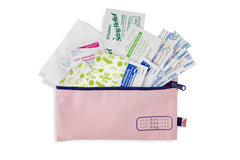
How did you go from practicing pediatrics to launching an innovative dishware company??
When I first introduced solids to my twins, I fed them from plastic bowls and with plastic spoons. My mother was horrified by this as she had concerns about the chemicals in plastic transferring into her grandchildren’s food. So one day, while I was at work, she replaced all of my plastic with traditional Indian stainless steel. I, like many Indians, grew up eating and drinking with steel plates and cups at our family dining table.
5 years later, The American Academy of Pediatrics (AAP) warned parents about plastic's harmful effect on children's hormones, growth and development. My mom’s instinct was backed by science.
As a Pediatrician I had access to the knowledge, and as an Indian Immigrant I had the solution for my 3 young kids. But I realized that almost EVERY American mother did not. If you walk down the aisle of any store, you will see mostly plastic feeding products for babies and kids. I wanted to bridge the gap between what science was saying and what the industry was offering.
My job as a pediatrician is to advocate for kids and so I felt compelled to start a company that is rooted in science to keep harmful chemicals off the dining table.
However, on my journey, I quickly understood the laxity of regulation for many food-related products. Today, there are more than 10,000 additives approved by the U.S. Food and Drug Administration (FDA). Many were carried over from the 1950s, and several have no research showing they are safe for people to eat or drink. So, I set out to work with scientists, physicians, legislators and environmentalists to set a new standard for children’s products.
From avoiding plastic in our products and packaging to using a coloring process that avoided toxic-run off to intentionally designing tableware that excites kids to eat healthy at a young age - I wanted each step to mean something for children AND Mother Earth.
After all, people and the planet are connected and the lasting impact between the two will be felt not by us, but by our children. Ahimsa is not just a business to me - it’s a chance to change the system, change our thinking, and take actionable steps to make a positive impact on the world. 
It’s such a beautiful, full circle thing that you were able to pull from this meaningful cultural aspect of your own childhood to leverage stainless steel dishware for good. How does Indian culture continue to play a role in your work and your brand?
I, along with most Indian families, grew up using stainless steel dishes for dining. When my mother replaced all of my children’s plastic with stainless steel and the AAP recommended using glass or stainless steel as an alternative to plastic, I knew stainless steel was my material of choice. I grew up in India, speak the language, and stainless steel is the material of choice there. As a result of Ahimsa’s connection to India our products are manufactured there.
Assuming that you never expected to be a founder of a dishware company when you first went to medical school, what would the powerhouse CEO Manasa of today tell med school Manasa?
Take the leap, you have everything it takes to be an entrepreneur and launch your own business. The difference between physicians and entrepreneurs is really our appetite for risk, and for good reason. You wouldn’t want your doctor to take a risk on your health, but in entrepreneurship you can take that leap of faith and come up with a minimal viable product. Often, physicians have really good ideas that stem from real world problems for your patients. What I think drives physicians is our patients, not profits. As an entrepreneur I had to shift my mindset and realize I am not selling something, I am offering a solution to a really big problem that can positively impact the world
You told us that Ahimsa means “avoiding harm” in Sanskrit. How does Ahimsa help families to avoid harm?
I took an oath to avoid harm when I founded Ahimsa. We keep this in mind with everything we do! I founded Ahimsa with the goal of educating and providing a solution for families that are using plastic, which is negatively affecting their children’s health. Ahimsa avoids harm for not only children’s health but also for our planet!
You’ve also said there is more microplastic in the ocean than stars in the Milky Way. How can we as parents do our part?
Small steps can make a big difference! We completely understand that plastic is the norm, and can be super hard to avoid. But every step, such as replacing your plastic dishes with stainless steel, makes a difference! Sharing the knowledge about the dangers of plastic on both children’s health and the environment with fellow parents that may not know can have a huge effect!
The fashion industry is a massive contributor to pollution. Here at Kibou we do our best to reduce waste and be a more sustainable brand. As a pediatrician and an environmental advocate, can you give parents 3 pieces of advice for reducing our own impact?
There are various ways to reduce our impact on the environment, especially in the kitchen! Avoiding disposable dishes/ cutlery can have such a big impact! After only two washes, stainless steel cutlery breaks even with disposable cutlery for environmental impacts. Another way to make a small change that is better for both the environment and your health is using compostable brushes rather than sponges! Compostable brushes harbor less bacteria and can be composted rather than thrown out when they need to be replaced. Another simple way to reduce your environmental impact is when shopping, if given the option, say no to receipt paper. Receipt paper contains plastic and cannot be recycled. 
Ahimsa is revolutionizing kids’ dishware. And it’s soooo pretty. Tell us about the design process! How long did it take to create the products and how did you get started?
I first discovered the beautiful titanium coated stainless steel in the hospital as medical implants use PVD (physical vapor deposition) which changes the color of titanium itself! I then thought about how captivating those colors would be for children’s dishes! Every product is intentionally designed to help make mealtime healthier and simpler. I wanted our bowls, plates, and cups to serve as tools as well as dishes. This is why our bowls and plates each equal a cup and can be used for measuring. The compartments in our plates are the perfect sizes to support age-appropriate portions as well.
What was it like to start this business? What was the hardest part?
I fell into entrepreneurship because I recognized the big problem and felt that I had the solution. However, I launched Ahimsa in January of 2020 right before the pandemic started and not only was it challenging as a new small business owner but also as a pediatric hospitalist. I was a frontline worker and our unit became the covid unit for children. I would work nights at the hospital and work on Ahimsa during the day. There were a lot of supply chain issues at the beginning of the pandemic and as you can imagine it was challenging as we were a very young small business.
You’ve shared the story of little Olivia who was battling cancer and was avoiding foods until her parents introduced Ahimsa stainless steel dishware. Why did that make a difference for her?
When four-year-old Olivia began her cancer battle two years ago, her parents faced an unexpected challenge during her treatment: chemotherapy changed how her food and drink tasted. Olivia’s medicines made her hypersensitive to taste and smell, so when served anything in plastic, silicone, or bamboo, she would simply refuse it because she could taste the changes. Olivia took Ahimsa dishes to every infusion and meal because it helped her receive the nutrition she needed while fighting cancer and the toxic effects of chemotherapy.
Beyond dishes at home, Ahimsa has also worked with schools and hospitals. What is the ideal future of dishware and Ahimsa at home and in institutions?
Our mission is to replace plastic wherever children dine. We hope to be in museums, parks, schools, hospitals and any institution where children dine and we can replace plastic with stainless steel!
Any exciting things coming next for Ahimsa?
Stay tuned because we have a really exciting Earth Day campaign coming up! 
Finally, we have to ask: where is the most unexpected place you’ve used your Kibou and what do you have in your Kibou at the moment?
I wore my Kibou bag at the Taj Mahal - it was so useful on all my travels for business and with my kids!
Manasa is giving Kibou readers a discount code: KIBOU15 for 15% off at Ahimsa.





Leave a comment